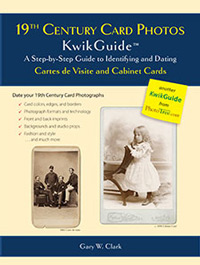 Photography, like any other “technology” has advanced in many distinct ways over it nearly 200 years of existence. In 1839 the commercial use of photography became a reality, and many different methods were tried and used to create permanent images. From metal and glass to paper and film, and ultimately digital media, the process for capturing and preserving images has changed and improved numerous times. For every major change in photo technology there have also been numerous more minor changes. With a little knowledge, one can learn to identify these different photo types and date their origin to within a few years.
Photography, like any other “technology” has advanced in many distinct ways over it nearly 200 years of existence. In 1839 the commercial use of photography became a reality, and many different methods were tried and used to create permanent images. From metal and glass to paper and film, and ultimately digital media, the process for capturing and preserving images has changed and improved numerous times. For every major change in photo technology there have also been numerous more minor changes. With a little knowledge, one can learn to identify these different photo types and date their origin to within a few years.
Around the world, there are innumerable photographs of people, of ancestors, who are unidentified by name and date. Whether on a desk, in a drawer or closet, stuffed in envelopes, photo albums or stacked in a box, these images are waiting to be identified. One of the most heavily used, of the 19th century photographic methods, were paper-based photographs glued to cartes de visite and cabinet cards. If you have ever seen a photo of your ancestors from the late 1800s to early 1900s, it is a good chance the picture was one of these two types of images.
Gary W. Clark has created a guide to help researchers identify and date these images to within a few years of their actual origin. 19th Century Card Photos KwikGuide: A Step-by-Step Guide to Identifying and Dating Cartes de Visite and Cabinet Cards covers both the history of these photographic technique along with a series of clues to help the reader date a card to within a few years, and sometimes, within a few miles of its origin. By evaluating the materials and methods of printing, where and style of the photographers imprints, the background choice, props, clothing, etc. researchers uncover clues as to a photos origins. If you have a image of an unnamed individual, but can place the photo to a relative time and place, there is a good chance you can user other bits of know family information to name the person in the picture.
Learning to identify and date card photos may just be the skill you need to bringing your ancestors to life, and into your life.
Contents
Introduction
Defining the Card Photograph
Why Study Old Photographs?
Protecting Your Old Photographs
Chapter 1 ~ A Brief History of Photography
The Paper Revolution Begins
Mass Production and Social Influences
Historical Review
Chapter 2 ~ Cartes de Visite
Historical Review
Cartes de Visite in America
Clue #1 ~ Card Thickness & Size
Clue #2 ~ Card Borders & Frames
Clue #3 ~ Corners, Edges, and Color
Clue #4 ~ Photographer Imprints
Clue #5 ~ Subject Image Size
Clue #6 ~ Federal Tax Stamps
Clue #7 ~ Hair and Fashion
Clue #8 ~ Studio Backgrounds & Props
Cartes de visite from Around the World
Carte de visite Checklist
Chapter 3 ~ Cabinet Cards
Historical Review
From Rustic to Elegant
Dating the Cabinet Card
Clue #1 ~ Card Edges
Clue #2 ~ Card Borders
Clue #3 ~ Card Colors
Clue #4 ~ Photographer Imprints
Clue #5 ~ Gelatin and Collodion Papers
Clue #6 ~ Special Effects
Clue #7 ~ Fashion and Clothes
Clue #8 ~ Studio Backgrounds & Props
Cabinet Card Review
Cabinet Cards Around the World
Cabinet Card Checklist
Chapter 4 ~ Studio Props
Infatuation with Studio Props
1880s – Crowded Cabinet Cards
Chapter 5 ~Unique Photograph Formats
Unique Sizes & Formats of the 19th Century
Chapter 6 ~20th Century Photograph Introduction
The Modern Photograph Era
Appendix A ~ Common Card Sizes
Appendix B ~ Research Website
Appendix C ~ Glossary
Notes
Index
19th Century Card Photos KwikGuide: A Step-by-Step Guide to Identifying and Dating Cartes de Visite and Cabinet Cards is available from Family Roots Publishing.
Gary’s KwikTips guides make excellent additions to this book. Each guide serves as a reminder, or easy-to-take-along reference, to the identification skills taught in this book. Click the titles below for more information on each:
- KwikTips: Carte De Visite And Cabinet Card Photographs
- KwikTips: Imprint Guide To Cartes De Visite And Cabinet Cards
- KwikTips: Daguerreotype, Ambrotype, And Tintype Photographs
About the Author
Gary Clark is a professional photographer, restorer, and genealogist who has merged these skills with his passion for collecting photographs. His 30 years of experience in digital imaging brings a unique and thorough understanding of photograph problems and how to solve them. Clark introduced PhotoTree.com to genealogists and collectors in 2000, and he continually expands the free information with a gallery of over 1,000 images, weekly case studies, and historical information about 19th century photographs